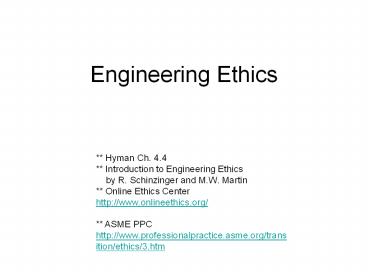Engineering Ethics - PowerPoint PPT Presentation
Title:
Engineering Ethics
Description:
Engineering Ethics ** Hyman Ch. 4.4 ** Introduction to Engineering Ethics by R. Schinzinger and M.W. Martin ** Online Ethics Center http://www.onlineethics.org/ – PowerPoint PPT presentation
Number of Views:342
Avg rating:3.0/5.0
Title: Engineering Ethics
1
Engineering Ethics
Hyman Ch. 4.4 Introduction to Engineering
Ethics by R. Schinzinger and M.W. Martin
Online Ethics Center http//www.onlineethics.org/
ASME PPC http//www.professionalpractice.asme
.org/transition/ethics/3.htm
2
Engineering Ethics
- The study of understanding moral values,
resolving moral issues and justifying moral
decisions in engineering practice. - Also can be considered beliefs and acceptable
practices ? codes of ethics - Finally, it is also the obligation, justification
and principles to be endorsed.
3
Learning Objectives
- Enhance the ability to deal with difficult
ethical decisions - Strengthen moral autonomy (self-determination)
the habit of thinking rationally about ethical
issues following appropriate moral principles ?
improve practical skills such as - Recognize and understanding ethical situations
- Critical thinking skill on assessing opposing
sides of ethical issues - Tolerate uncertainty and respect different
perspectives in decision making - Maintain moral integrity by integrating personal
convictions and professional practices (sweat the
small stuff) - Be articulate by learning common ethical language
(to support or oppose viewpoints)
4
Methodologies for Case Studies
- State of the art in engineering ethics an
article by Charles Harris (Texas AM) dedicated
on methodologies to resolve engineering ethical
issues through the use of case studies and other
schemes - Methods of Analysis and Problem Resolution
- Studied Cases micro-cases, macro-cases, and
exemplary cases. - Microethics (ex health and safety, integrity,
bribes/gifts, etc..), macroethics (less emphasis,
ex sustainability, nanotechnology, cloning,
etc..)
5
Sustainable Development Goals
- Biological (ecological) system
- Genetic diversity, resilience, biological
productivity - Economic system
- Increased production of goods and services,
satisfaction of basic needs or reducing poverty,
improvement in equality - Social system (least emphasized)
- Cultural diversity, social justice, gender
equality, participation
6
Methods of Analysis
- Factual Issues
- Conflicts over a matter of fact crucial to
problem solution (ex global warming data
interpretation) - Conceptual Issues
- Conflicts over a definition of a concept (ex
Terri Schiavo case, definition of death) - Application Issues
- Conflicts over the application of a concept in a
particular situation (conflict of interest) - Moral Issues
- Conflict between values or obligations (Spotted
Owl and Timber Industry controversy,
environmental and job protection)
7
Problem-Resolution (cont.)
- Bottom-Up Methods of Resolution (intuitive level
of moral thinking, moral common sense) - Weighing or balancing evaluate and weighs
alternatives - Casuistry/Line drawing comparing with cases with
clear ethical characteristics (positive or
negative) CASE STUDY - Creative middle ways acceptable compromise
- Top-Down Methods of Resolution (philosophical
theories) - Utilitarianism well being of the greatest number
of people (ex intellectual property, patented
drugs in underdeveloped countries) - Cost/benefit analysis
- Respect for persons justice and rights of
individuals
8
A Classical Ethical Dilemma
- Trolley problem or lifeboat problem
Adopted from http//web.lemoyne.edu/hevern/psy340
/lectures/psy340.12.1.emotions.html
9
Analogy between Moral Issues and Engineering
Design (C. Whitebeck, 2003)
- Require synthesis and analysis
- Usually without a simple correct solution
- Some solutions are better than others
- An acceptable solution must
- Achieve the desired goals
- Conform to given specifications
- Reasonably risk free
- Consistent with constraints
10
Some Ethics References
- Online Ethics Center-sample assignments for
student - Help on ethical decisions
- Numerical and design problems with ethical
content - Write case studies based on senior design
projects - Key concepts to teach engineering ethics































